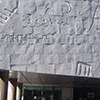The internationalization of architectural practice
Mobilizing dependence to secure and enhance (relational) autonomy on the construction site
DOI:
https://doi.org/10.18030/socio.hu.2020en.108Keywords:
global architects, relational autonomy, internationalization, materialization, professional practiceAbstract
More than any other profession, architecture has been shaped by the tension between autonomy and heteronomy. Recently, however, this dichotomy is seen as unproductive for understanding architects’ practices in-depth, especially in the context of the growing internationalization that is transforming and restructuring architectural practice. The paper applies the lens of ‘relational autonomy’, grasping architectural practice in relation to the actions of other built environment professionals, and to material artefacts. Dependence is framed not as a threat but as a productive potential. The focus of the paper is on the practices of less prominent architects in celebrity global firms. More specifically, the paper explores the practices enacted during the actual materialization of design-ambitious edifices, on-site and in the workshops of sub-contractors. The main argument is that less visible architects can secure and enhance the (relational) autonomy of global architects during construction, by actively shaping a specific working context, where they can purposefully mobilize dependence. Practices during construction generate new opportunities for creative engagement and enhance architects’ influence over processes beyond their autonomous actions, thereby enabling the making of products with high symbolic value.





